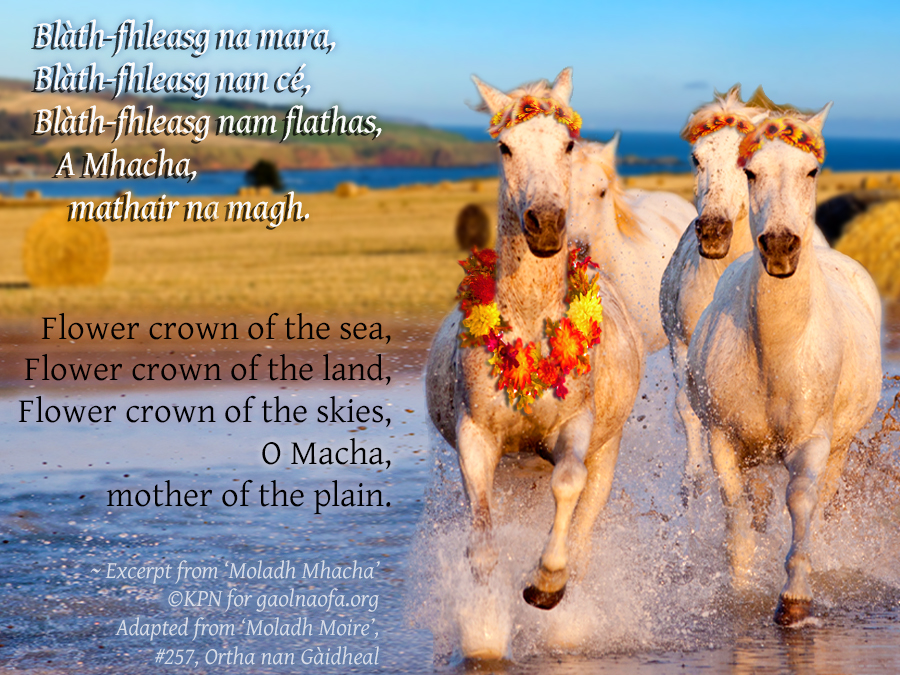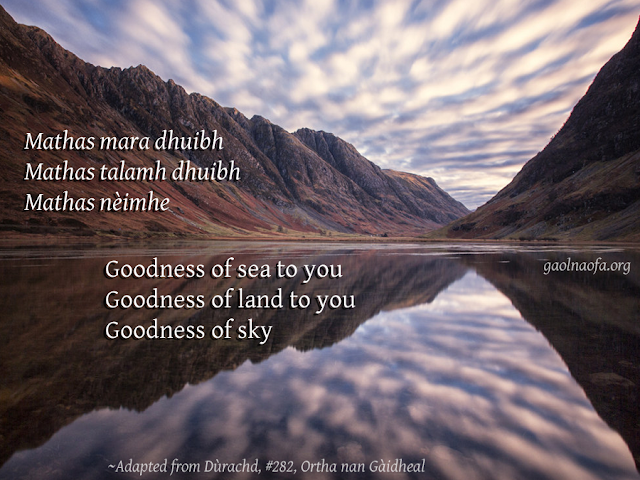Memes – Archive 1
Please note: The images we’ve used in creating these memes are courtesy of talented Scottish, Irish, Welsh and American photographers who have been kind enough to either grant us permission or licence these as Creative Commons on Flickr. The Creative Commons licence they have been released under means you are welcome to share these images on your social media freely, provided you give credit to the original photographer and a link back to the CC licence, as we have done.
Memes | Archive 1 | Archive 2 | Archive 3
 Original image: Ben Salter
Original image: Ben Salter
| A cheud sgeul air fear an taighe, Is sgeul gu làth’ air an aoidh. |
The first story from the host, And tales till morning from the guest. |
A Gaelic proverb from T.D. MacDonald’s Gaelic Proverbs & Proverbial Sayings (1926), which, it’s noted, “refers to the Highland house ceilidhs, or gatherings.”
Story-telling is always entertaining no matter the time of year, but some stories are more apt for a particular occasion than others. Many of the Irish tales we know today are centred around the festival period of Samhain, and they often have Otherworldly themes. These tales would be especially appropriate to look at in the run up to Samhain, or during your celebrations. Tales include:
Echtra Nerai – The Adventures of Nera
Cath Maige Tuired – The Second Battle of Tured
Airne Fingen – Fingen’s Nightwatch
Mesca Ulaid – The Intoxication of the Ulstermen
 Original images by Ivan Walsh (Horsies) and Michael Foley (Loughcrew)
Original images by Ivan Walsh (Horsies) and Michael Foley (Loughcrew)
| Ruth agus rath na teaghlaich, Rùn na Caillich, dìon Mhacha. |
Prosperity and strength of the family, Mystery of the Hag, shielding of Macha. |
‘Beannachd Strùain‘, adapted from the blessing of the strùthan in ‘Michael nam Buaidh, #77, Alexander Carmichael’s Ortha nan Gàidheal: The Carmina Gadelica Volume I (1940).1
The baking of the Strùthan Mhìcheil (a special bannock bread) is one of the major focuses of Là Fhèill Mìcheil. As the ingredients are mixed together, and then as the bannock is shaped, a blessing is said, either to Michael or to the spirits you honour at this time.
Following on from Kathryn’s blog post last week, we’ve adapted the blessing here for Macha and the Cailleach, both of whom may be related to the festival in their own ways. (Original image)
 Photo collage from original images by efilpera (horses) and Duarte JH (field)
Photo collage from original images by efilpera (horses) and Duarte JH (field)
| Blàth-fhleasg na mara, Blàth-fhleasg nan cé, Blàth-fhleasg nam flathas, A Mhacha, mathair na magh. |
Flower crown of the sea, Flower crown of the world, Flower crown of the skies, O Macha, mother of the plain. |
| Blàth-fhleasg na talamh, Blàth-fhleasg nan nèamh, Blàth-fhleasg nan taibhsean, A Mhacha, mathair na magh. |
Flower crown of the land, Flower crown of the sky, Flower crown of the spirits, O Macha, mother of the plain. |
| Blàth-fhleasg na h-àrais, Blàth-fhleasg nan reul, Blàth-fhleasg nam Magh Meall, A Mhacha, mathair na magh. |
Flower crown of the home, Flower crown of the stars, Flower crown of the otherworld, O Macha, mother of the plain. |
‘Moladh Mhacha‘, Adapted by KPN from ‘Moladh Moire‘ (Praise of Mary), song 257, in Alexander Carmichael’s Ortha nan Gàidheal: The Carmina Gadelica Volume III (1940).2
As seen in our Michaelmas video, the feast of St. Michael on Sep. 29 preserves many seasonal Gaelic customs, though they are mostly the same as ones observed at Lá Lúnasa or Oíche Shamhna in other regions. Pre-Christian deities whose qualities were inherited by Michael include Macha and Manannán.
Manannán already has his own festival at Midsummer. While many of us honour Taillte at Lúnasa, and the Morrígan at Samhain, perhaps Macha also deserves a festival of her own: Lá Fhéile Mhacha.
Like Michael, Macha is also associated with horses and the fields, and the traditional horse races held at this time could be dedicated to her, along with the swimming of the horses, the walking or riding the boundaries of the fields, and the baking and offering of the bannock/strùthan.
The Cailleach is also relevant now due to the equinox sunrise illuminating the inner chamber at Sliabh na Caillí/Loughcrew in Ireland. The last sheaf of the harvest is called the Cailleach, and the Cailleach an Dudain (“The Old Woman of the Mill”) dance is also traditional at this time.
Which deities we honour at these festivals can vary a bit with our differing bioregions, as well as which deities we have more affinity with and other factors that affect our households. Whoever you honour at this festival, we wish you a good one!
 Original image: Dawn Perry
Original image: Dawn Perry
| Glòir dhuit fhéin gu bràth, A ghealach gheal, a nochd, Is tu féin gu bràth, Lòchran àigh nam bochd |
Glory to you forever, O bright moon, tonight, You are ever, forever, The light of luck to those in need |
From Alexander Carmichael’s Ortha nan Gàidheal: The Carmina Gadelica Volume III (1940), song 304, titled ‘Geaslanachd na Gealaich’ (‘Moon Worship’).
The moon is a beautiful and welcome sight in the night sky, and in the days before street lights it was also an important one, providing some light to guide the way for travellers. There are many traditions surrounding the waxing and waning of the moon, some of which are detailed by Carmichael in the notes accompanying this prayer. There are also (and especially) traditions surrounding the first sighting of the new moon – the first new sliver of the waxing moon as it appears in the sky – which we have covered in our video on A’ Ghealach Ùr – The New Moon – where we describe how Gaelic Polytheists may observe the new moon with prayers and offerings. (Original link).
 Original image: Nicolas Raymond
Original image: Nicolas Raymond
Is maith cech dál dia ticc síd.
Any meeting that produces peace is good.
From the Middle Irish Diambad messe bad rí réil, ‘If I were an illustrious king.’ See Tadhg O’Donohue’s ‘Advice to a Prince,’ in Ériu Volume 9 (1921/1923). Translation by Dennis King at Sengoídelc. (Original link)
 Original image: John McSporran
Original image: John McSporran
| Mathas mara dhuibh Mathas talamh dhuibh Mathas nèimhe |
Goodness of sea to you Goodness of land to you Goodness of sky |
Dùrachd (“Good Wish”) from Alexander Carmichael’s Ortha nan Gàidheal: Carmina Gadelica Volume III (1940).
The Dùrachd is a Gaelic form of blessing given as a sign of good will and respect from one person to another. According to Martin Martin blessings like this were given as the person saying the prayer walked around the recipient three times (going deiseal, or sunwise):
“Some of the poorer sort of people in these islands retain the custom of performing these rounds sun-ways about the persons of their benefactors three times, when they bless them, and wish good success to all their enterprises.”
Carmichael recorded a number of these “Good Wishes,” and many of them mention the three realms and refer to mythological figures, giving them an older, polytheistic feel. (Original link)
 Original image: David Hegarty
Original image: David Hegarty
| Sinn ag loighe ar in lucht romhainn, lucht oile orainn san úaigh. |
We rest on those who came before us, and others will rest on us in the grave. |
From ‘Irish Grammatical Tracts,’ by Osborn Bergin, Ériu Volume 9 (1921/1923). (Original link)
 Original image: Denise Cross
Original image: Denise Cross
Trí caindle forosnat cach ndorcha: fír, aicned, ecna.
Three candles that illumine every darkness: truth, nature, knowledge.
From the Old Irish ‘Triads of Ireland,’ or Trecheng Breth Féne – more literally translating to “A Triad of Judgments of the Irish” – which consists of 214 triads (and some quatrains) that give pithy sayings about a variety of topics, including geography, law, customs, wisdom, and proper behaviour. The compilation is usually dated to sometime around the ninth century, based on linguistic analysis. Aicned, or “nature,” is in the sense of the nature or way of things (rather than nature in the environmental sense). (Original link)
Notes
1 Notes on ‘‘Beannachd Strùain‘:
* Adapted from the blessing of the strùthan in ‘Michael nam Buaidh, #77.
* Carmichael’s original: ‘Ruth agus rath an treo, Run Mhicheil, dion an Teor.‘
* treo is not in any Gaelic dictionary. Treó is “occasion, time, trip.” Changing to teaghlach, “family/household” (here in the genitive, “na teaghlaich ~ Of the family”)
2 Notes on ‘Moladh Mhacha‘:
* Adapted from ‘Moladh Moire’ , #257, by KPN for NNC and GN.
* Fliosg is not in Dwelly’s or other Gaelic dictionaries. I think it’s a typo on fleasg, which can mean garland, wreath, fillet or crown.
* Original line at end of stanzas is “Moire Màthair Dhé – Mary, Mother of God.”
* The modern Gaelic plural of the Old Gaelic / Old Irish mag or magh is maighean. While Carmichael’s archaic Gaelic often includes words in older forms of Irish – including plurals formed in this way that would allow for the better-sounding nam maigh for “of the plains” – unless you have footnotes or the chance to explain your choices beforehand, you will probably confuse people if you insert these archaic forms into modern Gaelic. In the singular, the “plain” that is referred to could be the great Plain that is Ireland, or the plain of Mag Mell. In English the mind tends to translate it to “plains”, but the singular works in the original mindset. To rhyme better with cé, you could use poetic license and go with the Older form in private.
* “nam aingeal – of the angels”, changed to “nan taibhsean – of the spirits.”
* àrois is also misspelled. Corrected to àrais.
* Original has “pàrrais,” genitive of pàrras, – paradise. Changed to Magh Meall, Gaelic spelling of OI Mag Mell, the Plain of Joy, one of the names of, or places in, the Otherworld.
For more on how we adapt traditional prayers (and check them for transcription or translation errors), see our Prayer article.